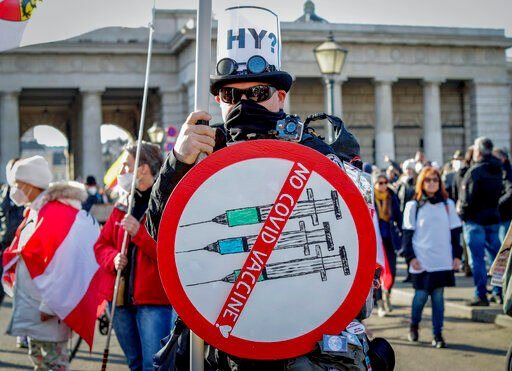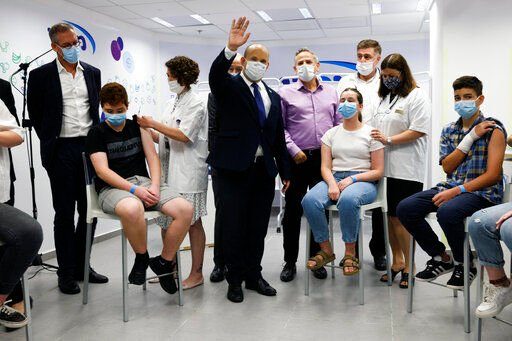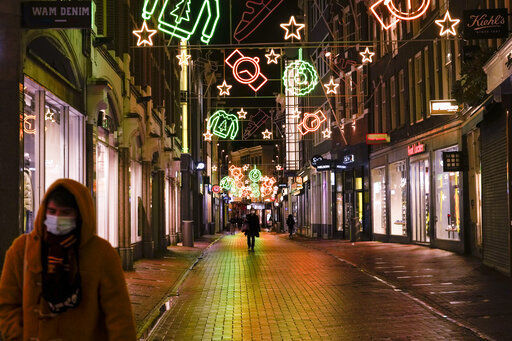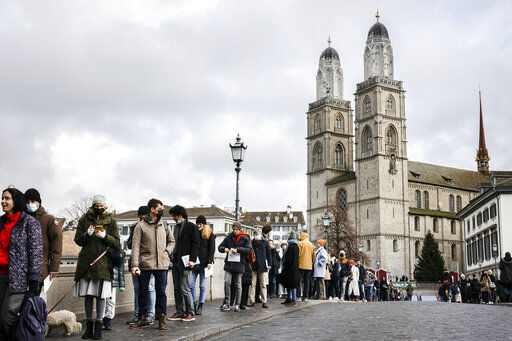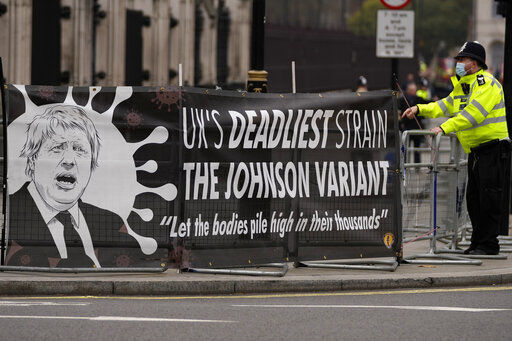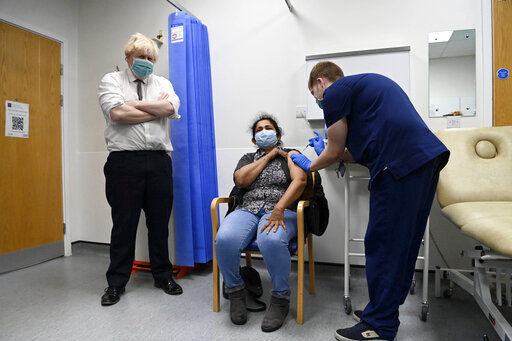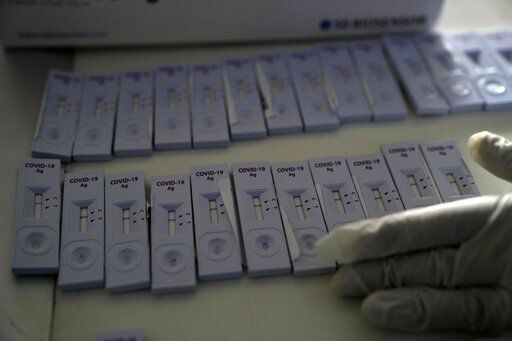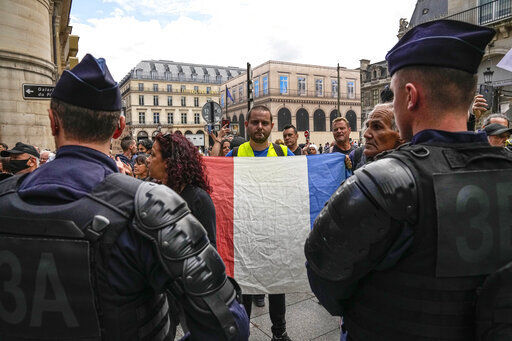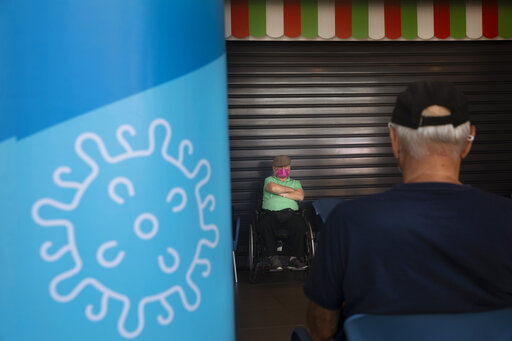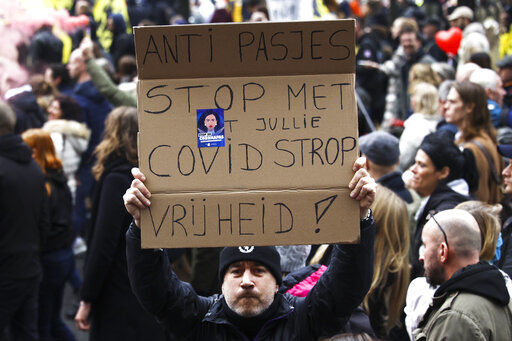PARIS — Greeks over 60 who refuse coronavirus vaccinations could be hit with monthly fines of more than one-quarter of their minimum pensions — a get-tough policy that the country’s politicians say will cost votes but save lives.
Weekly protests in the Netherlands over the country’s 5 p.m. lockdown and other new restrictions have descended into violence, despite what appears to be overwhelming acceptance of the rules.
In Israel, the government on Thursday halted the use of a controversial phone-tracking technology to trace possible cases of the new coronavirus variant after a public uproar.
With the delta variant of COVID-19 pushing up cases in Europe and growing fears over the omicron variant, governments around the world are weighing new measures for populations tired of hearing about restrictions and vaccines.
It’s a thorny calculus made more difficult by the prospect of backlash, increased social divisions and, for many politicians, the fear of being voted out of office.
“I know the frustration that we all feel with this omicron variant, the sense of exhaustion that we could be going through this all over again,” British Prime Minister Boris Johnson said Tuesday, two days after the government announced that masks would be mandatory again in stores and on public transportation and required all visitors from abroad to undergo a COVID-19 test and quarantine. “We’re trying to take a balanced and proportioned approach.”
New restrictions, or variations on the old ones, are cropping up around the world, especially in Europe, where leaders are at pains to explain what looks like a failed promise: that mass vaccinations would mean an end to widely loathed limitations.
“People need normality. They need families, they need to see people, obviously safely, socially distancing, but I really think, this Christmas now, people have had enough,” said Belinda Storey, who runs a stall at a Christmas market in Nottingham, England.
In the Netherlands, where the lockdown went into effect last week, mounted police patrol the streets to break up demonstrations. But most people appeared resigned to rush through errands and head home.
“The only thing we can do is to listen to the rules, follow them and hope it’s not getting worse. For me it’s no problem. I’m a nurse. I know how sick people get,” said Wilma van Kampen.
Huburt Bruls, who as mayor of the Dutch city of Nijmegen banned a protest last weekend, said he sympathized with the frustration but was prepared to carry out the national rules.
“There was a lot of disappointment in the effects of vaccination. Everybody did their best, we had one of the highest rates of vaccinations, and it wasn’t enough. Infections are higher than ever. I myself was a little disappointed, but we have to look ahead,” he said.
In Greece, residents over 60 face fines of 100 euros ($113) a month if they fail to get vaccinated. The fines will be tacked onto tax bills in January. About 17% of Greeks over 60 are unvaccinated despite various efforts to prod them to get their shots, and nine in 10 Greeks now dying of COVID-19 are over 60.
“I don’t care whether the measure will cost me some extra votes in the elections,” Prime Minister Kyriakos Mitsotakis said Wednesday after lawmakers passed the measure. “I am convinced that we are doing the right thing, and I am convinced that this policy will save lives.”
Employing a carrot instead of a stick, Slovakia’s government is proposing to give people 60 and older a 500-euro ($568) bonus if they get vaccinated.
In Israel, the government this week briefly resumed using a phone-monitoring technology to perform contact tracing of people confirmed to have the omicron variant, only to halt its use on Thursday.
“From the beginning I noted that use of this tool would be limited and brief — for a few days, in order to get urgent information to halt infection with the new, unknown variant,” Health Minister Nitzan Horowitz said on Twitter.
In South Africa, which alerted the World Health Organization to the omicron variant, previous restrictions included curfews and a ban on alcohol sales. This time, President Cyril Ramaphosa is simply calling on more people to get vaccines “to help restore the social freedoms we all yearn for.”
Germany on Thursday imposed strict new limitations on the unvaccinated, excluding them from nonessential stores, restaurants, and other major public venues. They can go to work only with a negative test.
The legislature is expected to take up a general vaccine mandate in coming weeks.
German Chancellor Angela Merkel said the measures were necessary because hospitals risked becoming overloaded: “The situation in our country is serious.”
In the U.S., there is little appetite in either political party for a return to lockdowns or strict contact tracing. Enforcing even simple measures like mask-wearing has become a political flashpoint. And Republicans are suing to block the Biden administration’s new get-vaccinated-or-get-tested requirement for large employers.
On Thursday, President Joe Biden, whose political fate may well hinge on controlling the pandemic, moved to tighten testing requirements for people entering the U.S., and recommended Americans wear masks indoors in public. But he said his new strategy “doesn’t include shutdowns and lockdowns,” and he hoped for bipartisan backing.
“It’s a plan that I think should unite us,” he said.
The rise of the new variant makes little difference to Mark Christensen, a grain buyer for an ethanol plant in Nebraska. He rejects any vaccination mandate and doesn’t understand why it would be needed. In any event, he said, most businesses in his corner of the state are too small to fall under the regulations.
“If they were just encouraging me to take it, that’s one thing,” Christensen said. “But I believe in freedom of choice, not decisions by force.”
Chile has taken a harder line since the emergence of omicron: People over 18 must receive a booster dose every six months to keep their pass that allows access to restaurants, hotels and public gatherings.
Dr. Madhukar Pai, of McGill University’s School of Population and Public Health, said that masks are an easy and pain-free way of keeping transmission down, but that cheap, at-home tests need to be much more widespread, in both rich and poor countries.
He said both approaches give people a sense of control over their own behavior that is lost with a lockdown and make it easier to accept the need to do things like cancel a party or stay inside.
Pai said requiring boosters universally, as is essentially the case in Israel, Chile and many countries in Europe, including France, will only prolong the pandemic by making it harder to get first doses to the developing world. That raises the odds of still more variants.
Lockdowns, he said, should be the very last choice.
“Lockdowns only come up when a system is failing,” he said. “We do it when the hospital system is about to collapse. It’s a last resort that indicates you have failed to do all the right things.”


